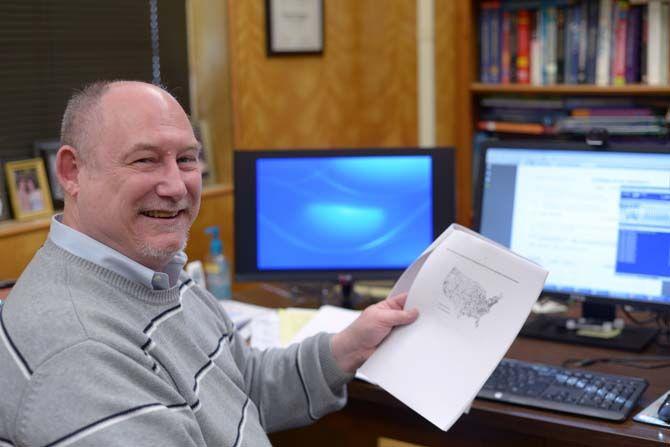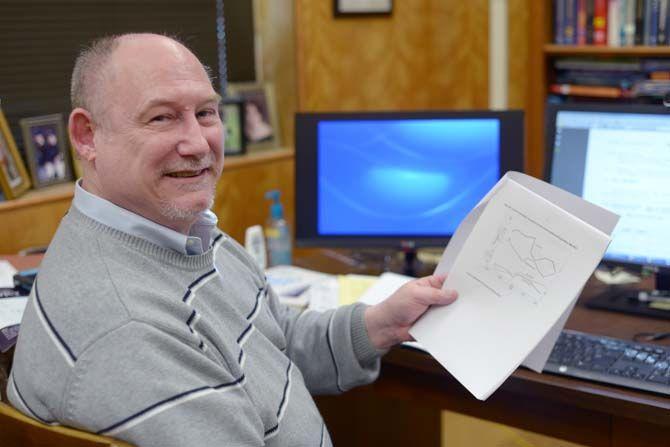Last year was the ninth coldest year in recorded Louisiana history, but it was ranked as the hottest year in global history, said Louisiana State climatologist Barry Keim.
Keim, along with University political science professor James Garand, recently published a study drawing correlations between trends in people’s local climate, their political affiliations and their perceptions of whether global warming or climate change is real and caused by human actions.
The scientific consensus is that the world is getting hotter and humanity’s greenhouse gas emissions have a hand in it, but the public is divided on this topic, Garand said.
People who experience warmer summers are more likely to be on board with scientists’ views of climate change than those who do not, and people who are are more conservative politically are less likely to be on board, the study titled “Weather, Climate, and the Economy: Explaining Risk Perceptions of Global Warming, 2001-2010,” found.
“We were interested in how Americans think about climate change,” Garand said. “Scientists are interested in climate, but people’s experience with weather might affect how they think of climate change.”
Garand and Keim, along with then doctoral student Wanyun Shao and University of New Hampshire professor of sociology Lawrence Hamilton, collected data from surveys about Americans’ views on climate change and then paired it with climate data from the hometowns of survey subjects.
“We have short memories, and we’re very myopic in view,” Keim said about people’s perception of climate. “We see only what’s happening right here.”
The most shocking thing about the findings, Keim said, was political affiliation was a better predictor of people’s perceptions about climate change than the weather near them.
Garand said the study found the percentage of people who aligned themselves as firm Democrats and believed climate change to be true increased with years of education beyond high school. However, the percentage of people who aligned themselves as firm Republicans perception of climate change did not change with additional education.
College Democrats president Josh Turner said he thinks Republicans’ responses may be influenced by more conservatives of the party.
“What I really think it is is the information that the Republican Party is really built up over the years, like Rush Limbaugh, and it kind of moved to FOX News.” Turner said. “It’s like they take a stance on an issue, and regardless of new findings, they continue to back it. They are going to believe party leaders over scientists.”
Garand said he thinks it reveals how each party’s members might respond to additional information about a topic.
“How Democrats respond to additional information is very different from how Republicans respond,” he said.
Keim said in another study about climate change perception he worked on in the past, he found, as firm Republicans and Democrats gained years of education, their views of climate change grew more polarized.
“Essentially, as Republicans’ education increased, they were even more skeptical, and as Democrats’ education increased, they grew to trust scientists’ views more,” Keim said.
Last year was the ninth coldest year in recorded history for Louisiana, but it was ranked as the hottest year in global history, said Louisiana State climatologist Barry Keim.
Keim, along with University political science professor James Garand, recently published a study drawing correlations between trends in people’s local climate, their political affiliations and their perceptions of whether global warming or climate change is real and caused by human actions.
The scientific consensus is the world is getting hotter and humanity’s greenhouse gas emissions have a hand in it, but the public is divided on this topic, Garand said.
People who experience warmer summers are more likely to be on board with scientist’s views of climate change than those who do not and people who are are more conservative politically are less likely to be on board, the study, titled “Weather, Climate, and the Economy: Explaining Risk Perceptions of Global Warming, 2001-2010,” found.
“We were interested in how Americans think about climate change,” Garand said. “Scientists are interested in climate, but people’s experience with weather might affect how they think of climate change.”
Garand and Keim, along with then doctoral student Wanyun Shao and University of New Hampshire professor of sociology Lawrence Hamilton, collected data from surveys about Americans’ views on climate change and then paired it with climate data from the hometowns of survey subjects.
“We have short memories, and we’re very myopic in view,” Keim said about people’s perception of climate. “We see only what’s happening right here.”
The most shocking thing about the findings, Keim said, was that political affiliation was a better predictor of people’s perceptions about climate change than the weather near them.
Garand said the study found the percentage of people who aligned themselves as firm Democrats and believed climate change to be true increased with years of education beyond high school. However, the percentage of people who aligned themselves as firm Republicans perception of climate change did not change with additional education.
College Democrats president Josh Turner said he thinks Republicans’ responses may be influenced by more conservatives of the party.
“What I really think it is is the information that the republican party is really built up over the years, like Rush Libaugh, and it kind of moved to FOX news.” Turner said. “Its like they take a stance on an issue, and regardless of new findings they continue to back it. They are going to believe party leaders over scientists.”
Garand said he thinks reveals how each party’s members might respond to additional information about a topic.
“How Democrats respond to additional information is very different from how Republicans respond,” he said.
Keim said in another study about climate change perception he worked on in the past, he found, as firm republicans and democrats gained years of education, their views of climate change grew more polarized.
“Essentially, as Republicans’ education increased they were even more skeptical, and as Democrats’ education increased they grew to trust scientists’ views more,” Keim said.
Global warming research draws political connections
January 21, 2015
More to Discover









